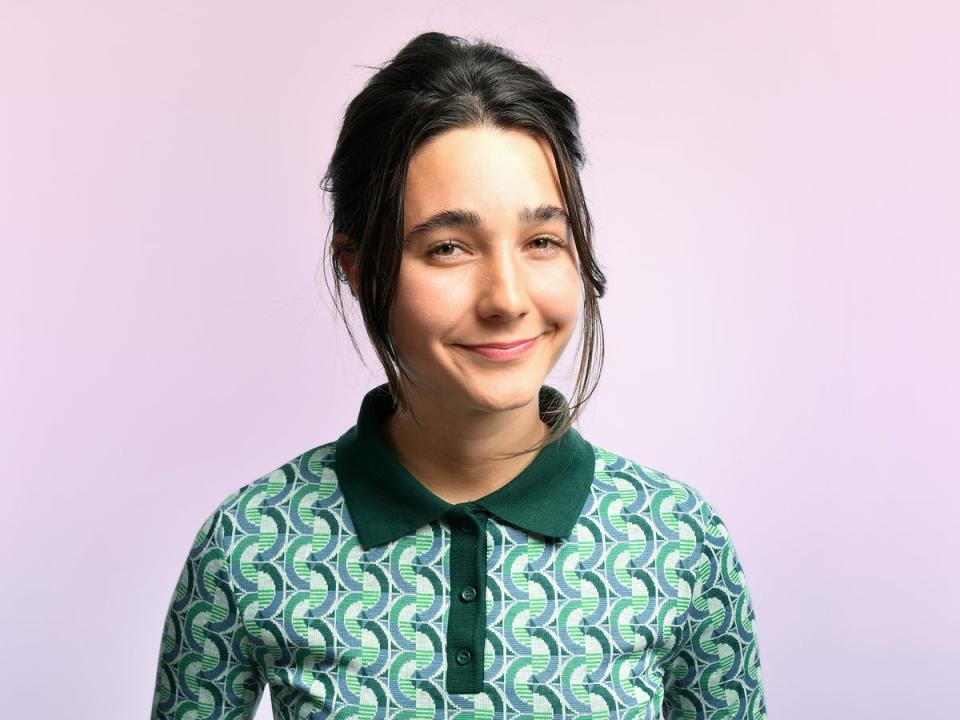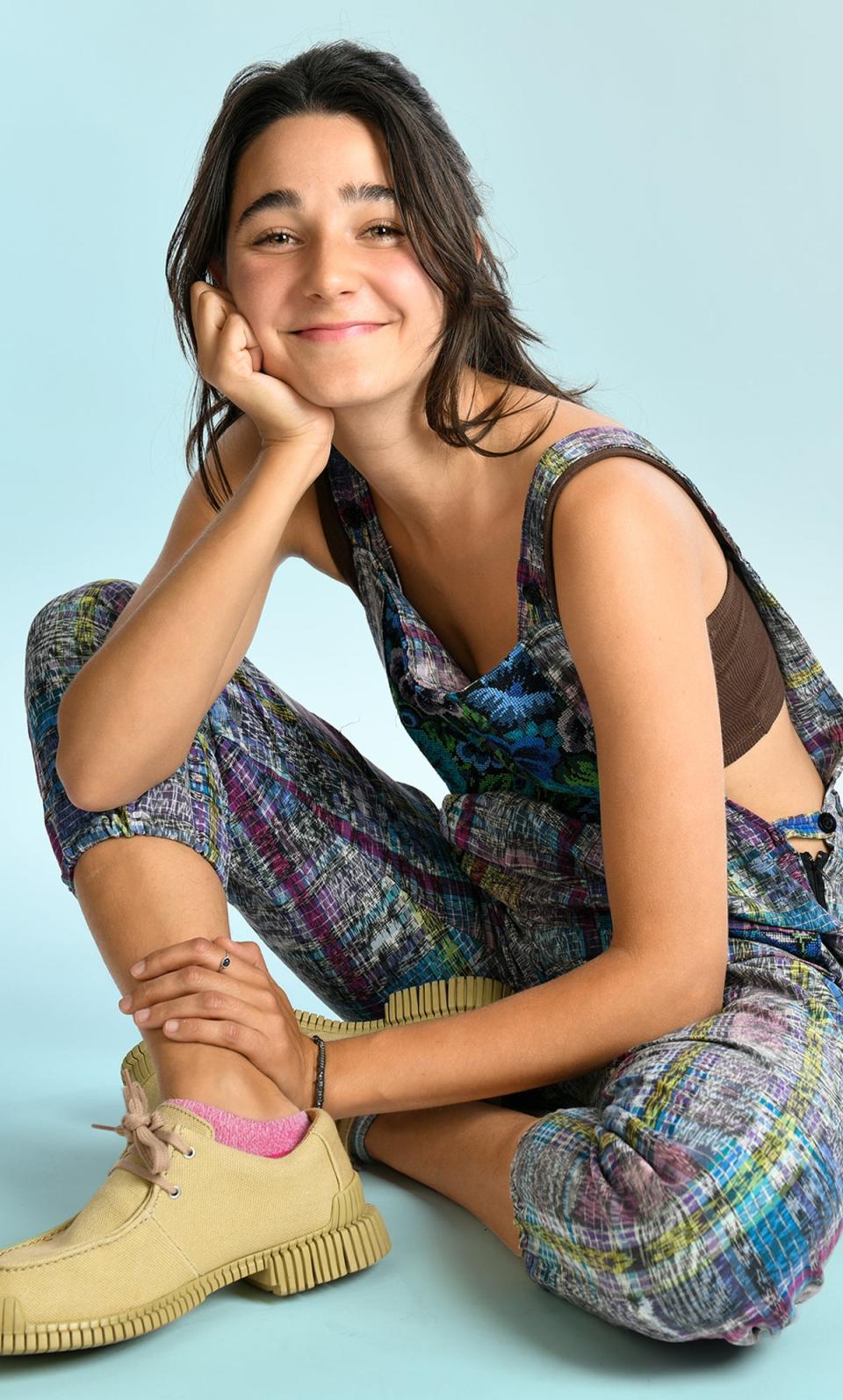Lara Ricote: ‘I won the Funny Women award on a terrible day – I had gotten my hearing aids stuck in my ear’

For comedian Lara Ricote, her race, gender and disability have always been a big part of her identity. That she can “pass” without people noticing any of them. “I’m Latina, but you can’t know it immediately if you just see me, and I’m hard of hearing, but you don’t necessarily know it,” she tells me. “I speak in a weird ass way… but it just seems like I have a cartoonish voice. But really it’s because I’m hard of hearing and I say everything weird, I’m trying to make out the things that I am saying.” The same can be said for her gender, and “how much of a woman I feel”.
She may be young (Ricote’s website describes her as “a twenty-something-year-old”), but Ricote is currently embarking on one of the most highly anticipated Edinburgh Fringe debuts of the summer. This is largely thanks to her title as the reigning winner of the Funny Women award, setting her among titans of the comedy circuit such as London Hughes, Katherine Ryan and Desiree Birch. Ricote never expected to win the 2021 final, which took place on a truly “terrible day”. “I had gotten my hearing aids stuck in my ear… all of it was so s***ty, but then it was so good because that happened,” she says to me over Zoom (for what it’s worth, her voice isn’t that cartoonish). “[Then] I got the opportunity to go to Edinburgh and I was thinking, I don’t even know how ready I am because I’ve never done anything like this. So everything feels like, what the f*** am I doing?... I feel like I’m jumping into the ocean and I’ve got no idea what’s underneath.”
Hailing from Mexico but based in Amsterdam, Ricote grew up among a sea of performers. Her mum and younger sister work as soap actors back home. Being deaf (both Ricote and her sister have degenerative hearing loss) never held her back. Growing up, the Ricote kids were put in acting classes, more to help them get in touch with their emotions than to become thesps. Comedy came into her life first in the form of improv, introduced to her by her sister who, while visiting Ricote in the Netherlands four years ago, suggested they went to a class together. She quickly moved on to stand-up and hasn’t stopped since. “I’ve never had a week where I haven’t done it,” she says. “I was like, ‘Oh, I think this is the thing I want to do for the rest of my life.’ I had never felt that sort of joy before.”
Ricote’s own rise came in tandem with Amsterdam’s then-emerging comedy scene. “There were no [comedy club] nights so everything was new ground,” she says. “I think I did eight minutes for my second time – in places like New York, that’s unimaginable.” She swiftly carved out her niche. “Being a woman also and being Latin American and being young, all these things are like my token little things,” Ricote says, matter-of-factly. “You always need at least one disabled person on your show or one woman. It really gave me a lot of spots early on. And that was good. I was good at it.”
Identity has played a huge part in Ricote’s performances. Hence the title of her new comedy hour: GRL/LATNX/DEF. Ricote calls it her “minority show”, exploring the intersections where her gender, race and disability link and overlap. “I feel like being a minority is very in right now,” she tells me, completely deadpan. “I feel like everybody’s using [ancestry DNA test] 23andMe to see what part minority they are and that’s never been part of our reality. In all of history, we’ve all just been trying to be white men, and trying to pass as white men. It’s a really good time to be me right now.”
As the show has evolved, a new aspect of Lara’s personality has worked its way on stage: climate activism. Ricote studied political theory at the University of Amsterdam and has often incorporated it in her work. During the pandemic, she received arts funding from the Dutch government to create a parody corporate workshop called Training for the End of the World. While the link between identity and the climate crisis may not immediately be clear, Ricote explains: “I felt like so stupid doing a show about identity. What does identity even matter when we’re all burning? Everything seems ephemeral and not important as soon as we realise that we have little time left.”
[At Fringe], you go in knowing you’re gonna lose a bunch of money and that’s a terrible thing
For Ricote, comedy has been a way of “channelling that anxiety”. “I don’t think my comedy’s doing something or changing the world. But I do feel like I have a lot of things I want to say… and I think that it’s a really nice way to transmit anything,” she says. The subject matter may be serious, but Ricote handles it with a light touch. On stage, she plays a version of herself from a parallel universe who joined Extinction Rebellion and is visiting to chastise her for not dedicating her life to fighting climate change. Ricote loves the silly stuff, “miming s***” on stage or describing the podcasts she’s pretending to listen to through her Bluetooth-enabled hearing aids. “I have a funny body, people at least tell me,” she says. How so? “Just my arms are kind of longish and I have these weird skinny legs. There’s something about me that’s a little bit silly to watch move around.”
People, it turns out, love telling Ricote about herself. As we speak, she’s currently in the middle of her Edinburgh warm-up shows in London. It’s her first time performing to really small, not-quite crowds (“Three people, it’s very little people – just two more than me!”), but it’s been a net positive learning experience. Small audiences mean direct feedback – although Ricote says she has “that kind of vibe and face [where] people just tell me whatever they want” anyway.
No comic wants to play to an empty audience, but these have become an accepted part of the Fringe experience. Ricote’s willingness to admit that this can be “disheartening” feels refreshingly honest. “It’s like watching a movie by yourself,” she says. It’s far easier to get a sold-out crowd on side and laughing along than when “it’s me, staring at you, doing my jokes, with three of us in a well-lit room and it’s hot”.

Conversations around the festival’s accessibility for artists always raise their heads in the months before the Fringe, but in this post-lockdown year, they’ve felt louder than ever. Ricote’s not even been yet and has heard horror stories. “It’s crazy… you go in knowing you’re gonna lose a bunch of money and that’s a terrible thing,” she says. Artists have to pay for their venues and to be eligible for the Fringe programme, while soaring accommodation costs around the city (Ricote was originally going to pay £1,500 for a room 45 minutes out of the city) are bankrupting emerging performers. “I can’t believe how many people are taking on that risk to just go and try it out… clearly, somebody else is gonna be like, ‘Hey, we’ll do a better Fringe here’ and then it will all shift if they don’t change anything.”
Yet what’s brought Ricote to the Fringe, even knowing it’s expensive and there may be empty audiences, is the excitement. She’s nervous, sure, but ultimately “pumped” about the whole thing. “I mostly want to feel like I’m proud of myself for doing something that’s out of my comfort zone,” she says. “It’s my first show, so I just want to grow and see the places where I can go. I don’t want to obsess about anything that’s going to be detrimental. Because it’s just the beginning. It’s just starting. It should be clunky and it should be weird. I’m not a genius, I’m just a girl who’s trying to do it.”
‘Lara Ricote: GRL/LATNX/DEF’ runs 10-16 August and 18-28 August at Monkey Barrel Comedy, as part of the Edinburgh Fringe

 money
money 